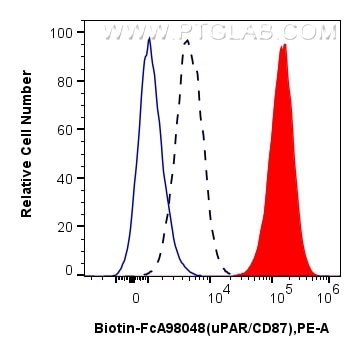Tested Applications
| Positive FC detected in | PMA treated U-937 cells |
Recommended dilution
| Application | Dilution |
|---|---|
| Flow Cytometry (FC) | FC : 0.25 ug per 10^6 cells in a 100 µl suspension |
| This reagent has been tested for flow cytometric analysis. It is recommended that this reagent should be titrated in each testing system to obtain optimal results. | |
| Sample-dependent, Check data in validation data gallery. | |
Product Information
Biotin-FcA98048 targets uPAR/CD87 in FC, ELISA applications and shows reactivity with human samples.
| Tested Reactivity | human |
| Host / Isotype | Rabbit / IgG |
| Class | Recombinant |
| Type | Antibody |
| Immunogen |
CatNo: Eg0901 Product name: Recombinant Human uPAR/PLAUR protein (His Tag) Source: mammalian cells-derived, pHZ-KIsec-C-6*HIS Tag: C-6*HIS Domain: 23-303 aa of NM_002659.4 Sequence: LRCMQCKTNGDCRVEECALGQDLCRTTIVRLWEEGEELELVEKSCTHSEKTNRTLSYRTGLKITSLTEVVCGLDLCNQGNSGRAVTYSRSRYLECISCGSSDMSCERGRHQSLQCRSPEEQCLDVVTHWIQEGEEGRPKDDRHLRGCGYLPGCPGSNGFHNNDTFHFLKCCNTTKCNEGPILELENLPQNGRQCYSCKGNSTHGCSSEETFLIDCRGPMNQCLVATGTHEPKNQSYMVRGCATASMCQHAHLGDAFSMNHIDVSCCTKSGCNHPDLDVQYR Predict reactive species |
| Full Name | PLAUR |
| Calculated Molecular Weight | 37 kDa |
| GenBank Accession Number | NM_002659.4 |
| Gene Symbol | uPAR |
| Gene ID (NCBI) | 5329 |
| Conjugate | Biotin |
| Excitation/Emission Maxima Wavelengths | - |
| Form | Liquid |
| Purification Method | Protein A purification |
| UNIPROT ID | Q03405-1 |
| Storage Buffer | PBS with 0.09% sodium azide, pH 7.3. |
| Storage Conditions | Store at 2-8°C. Avoid exposure to light. Stable for one year after shipment. |
Background Information
uPAR, also known as CD87, is a highly glycosylated, GPI-anchored membrane protein. In addition to the membrane-anchored form, uPAR is released from the plasma membrane by cleavage of the GPI anchor and can be found as a soluble form (suPAR). uPAR contains three homologous domains (D1-D3) of which the N-terminal one (D1) represents the uPA-binding domain. After binding to uPAR, uPA cleaves plasminogen, generating the active protease plasmin which is involved in a wide variety of physiologic and pathologic processes. In addition to regulating proteolysis, uPAR has important function in cell adhesion, migration and proliferation. Studies reveal that uPAR expression is elevated during inflammation and tissue remodeling and in many human cancers, in which it frequently indicates poor prognosis. (PMID 20027185; 12461559)
Protocols
| Product Specific Protocols | |
|---|---|
| FC protocol for Biotin uPAR/CD87 antibody Biotin-FcA98048 | Download protocol |
| Standard Protocols | |
|---|---|
| Click here to view our Standard Protocols |




